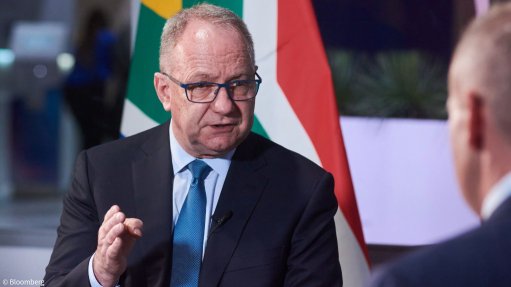Fiscal discipline in Budget, but 5% infrastructure expenditure increase ‘barely positive’ – Minerals Council
Finance Minister Enoch Godongwana maintained focus on fiscal discipline and balancing the need to address socioeconomic challenges facing the country, industry organisation Minerals Council South Africa said in response to the Minister’s Budget Speech on February 21.
South Africa, however, needs faster growth of private and public sector fixed investment, and rapid implementation of deep structural reforms to allow the private sector to participate in key areas of the economy, it stressed.
National Treasury’s latest outlook for public infrastructure expenditure shows an increase, on average, of only 5% in nominal terms over the next three years.
“This is barely positive in real terms and not enough to lift South Africa’s growth potential, despite plenty of emphasis on enabling more investment in the Budget documentation,” said Minerals Council chief economist Hugo Pienaar.
The R39.2-billion, or 50%, year-on-year fall in corporate income tax receipts from the mining industry in the first ten months of the fiscal year drove the total projected tax revenue shortfall for the 2023/24 financial year of R56.1-billion
By comparison, corporate tax collected from the non-mining sectors of the economy declined by R1-billion during the same period, Pienaar pointed out.
“The mining industry is severely constrained by a drastic downward correction in prices of various commodities, including platinum-group metals (PGMs) and coal, and the consequences of record high levels of loadshedding by State-owned Eskom and Transnet’s deteriorating rail and port services,” he said.
A key area of structural reform has been to improve the operational performance of struggling State-owned enterprises, including Eskom and Transnet.
“The budget showed some tough love to Eskom. Because the company will fail to dispose of the Eskom Finance Company by the agreed date of March 31, 2024, Treasury has proposed that the company’s bailout assistance be cut by R2-billion in 2023/24 and 2024/25,” Pienaar highlighted.
While acknowledging that it would take time to see improvement at Transnet, the Budget made no additional allocations for it on top of the R47-billion guarantee provided in late-2023. Until March 2024, Transnet may only use R14-billion of this to pay off maturing debt, he noted.
For mining in particular, progress on improving the operational performances of State-owned enterprises was crucial, given Treasury’s mixed assumptions for major commodity prices, which saw platinum, palladium and coal prices even lower in 2024 than 2023. A largely stable iron-ore price was assumed, with the gold price assumed to again outperform, he added.
“While it is pleasing to see a lower debt profile than outlined in the November Medium Term Budget Policy Statement (MTBPS), despite expenditure constraint and tax increases, the debt dynamics are more precarious than presented a year ago in the 2023 Budget.
“This highlights that government needs to stay the course on enabling growth-enhancing structural policy reforms. The only sustainable solution to South Africa’s fiscal problems is notably higher levels of real gross domestic product (GDP) growth,” Pienaar emphasised.
“State-owned enterprises must continue to be held accountable to realistic timeframes on reform milestones to unlock ongoing financial assistance from National Treasury. We encourage continued robust engagement between Treasury and State-owned entities such as Eskom and Transnet that are crucial for the mining sector,” said Minerals Council CEO Mzila Mthenjane.
The Minerals Council and its members, acting through Business for South Africa, are actively engaged with the Presidency, Ministers and the executives of Eskom and Transnet to urgently stabilise electricity supply and rail and port services by allowing and encouraging private sector participation in these sectors, he added.
Further, there was a lot to like about the Budget, including the commitment to target primary budget surpluses and the fact that the gross debt-to-GDP ratio was now expected to peak somewhat lower at 75.3% during the 2024/25 fiscal year, Pienaar said.
“However, the scale of the country’s fiscal difficulties is highlighted by the fact that tough decisions, as well as a likely once-off windfall, were needed to engineer a lower debt trajectory.
“These actions were necessary against a macroeconomic backdrop where Treasury projects real GDP growth to pick up to a rather subdued 1.6% in real terms between 2024 to 2026.”
The Minister made tough decisions in the Budget, including tax increases amounting to R15-billion in 2024/25, as the Budget laid bare the adverse government revenue impact of declining profitability in the mining sector.
The tax increases for 2024/25 were focused on individuals, with the personal income tax brackets, tax rebates and medical tax brackets not adjusted to counter the impact of inflation. In addition, taxes on alcohol and tobacco were increased by more than inflation. On a positive note for households and companies that used a lot of petrol and diesel, including the mining sector, fuel levies would not be increased in 2024, Pienaar said.
Another tough decision was implementing the global minimum corporate tax. This proposes that from January 1, 2024, South African multinationals with annual revenue exceeding €750-million will have an effective tax rate of at least 15%, regardless of where the profits are earned.
“This is in line with [developed economies body] the Organisation for Economic Cooperation and Development’s base erosion and profit-sharing framework. The proposal is expected to raise corporate tax collections by R8-billion in 2026/27,” said Pienaar.
Additionally, the expenditure constraint in the Budget was another tough decision.
Besides big-ticket additional allocations to finance the public sector wage bill and to extend the Covid-19 Social Relief of Distress Grant beyond 2024/25, government is budgeting for subdued spending growth.
“In real terms, consolidated non-interest government expenditure is projected to decline by an average of 0.5% over the next three fiscal years, and no major allocations were made for the introduction of National Health Insurance,” he noted.
Further, tapping valuation gains from the Gold and Foreign Exchange Contingency Reserve Account (GFECRA) was a tough decision.
A major reason for the lower debt trajectory is a frontloaded agreement between the National Treasury and the South African Reserve Bank where Treasury will draw down a portion, amounting to R150-billion, of the proceeds from the GFECRA over the next three fiscal years.
Relative to the MTBPS projection, this would save the country around R30-billion in debt-service costs, Pienaar concluded.
Comments
Press Office
Announcements
What's On
Subscribe to improve your user experience...
Option 1 (equivalent of R125 a month):
Receive a weekly copy of Creamer Media's Engineering News & Mining Weekly magazine
(print copy for those in South Africa and e-magazine for those outside of South Africa)
Receive daily email newsletters
Access to full search results
Access archive of magazine back copies
Access to Projects in Progress
Access to ONE Research Report of your choice in PDF format
Option 2 (equivalent of R375 a month):
All benefits from Option 1
PLUS
Access to Creamer Media's Research Channel Africa for ALL Research Reports, in PDF format, on various industrial and mining sectors
including Electricity; Water; Energy Transition; Hydrogen; Roads, Rail and Ports; Coal; Gold; Platinum; Battery Metals; etc.
Already a subscriber?
Forgotten your password?
Receive weekly copy of Creamer Media's Engineering News & Mining Weekly magazine (print copy for those in South Africa and e-magazine for those outside of South Africa)
➕
Recieve daily email newsletters
➕
Access to full search results
➕
Access archive of magazine back copies
➕
Access to Projects in Progress
➕
Access to ONE Research Report of your choice in PDF format
RESEARCH CHANNEL AFRICA
R4500 (equivalent of R375 a month)
SUBSCRIBEAll benefits from Option 1
➕
Access to Creamer Media's Research Channel Africa for ALL Research Reports on various industrial and mining sectors, in PDF format, including on:
Electricity
➕
Water
➕
Energy Transition
➕
Hydrogen
➕
Roads, Rail and Ports
➕
Coal
➕
Gold
➕
Platinum
➕
Battery Metals
➕
etc.
Receive all benefits from Option 1 or Option 2 delivered to numerous people at your company
➕
Multiple User names and Passwords for simultaneous log-ins
➕
Intranet integration access to all in your organisation





















